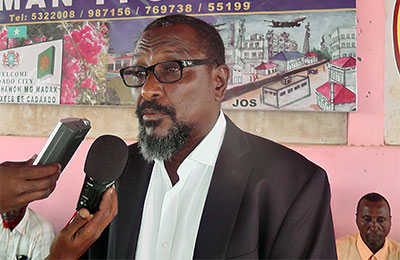It could have been the script for a John Le Carré intrigue. On Saturday October 12, Belgian security agents arrested Mohamed Abdi Hassan, a kingpin of Somali piracy known as “Afweyne” (Big Mouth), and his associate Mohammed M. Aden, nicknamed Tiiceey, a former governor of Himan and Heeb province.
They were snatched on their arrival at Brussels airport as they were disembarking from a flight from Nairobi and immediately sent to prison in Bruges under charges of “piracy, kidnapping, and organized crime” for their alleged participation in the capture of a Belgian ship and of its crew off the Somali coast in 2009.
How did it happen that these two men literally jumped into the lion’s den? Because they were duped in a sting operation. Since the end of the 70-day hostage taking–which had been resolved after a ransom was delivered to the pirates–Belgian authorities had vowed to grab the authors and their sponsors. Convinced that an international warrant would not be acted upon by Somali authorities, the Belgian police decided to go undercover.
According to Belgian federal prosecutor Johan Delmulle, police agents posing as documentary filmmakers contacted Tiiceey and asked him to put them in touch with Mohamed Abdi Hassan. After months of discussions, the pirate was eventually tricked into traveling to Brussels with a promise that he would be the chief adviser for a documentary film “reflecting his life of piracy on the high seas.”
The sting operation was met with applause in Brussels. “This arrest marks a significant step in the fight against piracy,” said a spokesman for EU foreign policy chief Catherine Ashton. The ruse, however, immediately raised eyebrows among journalists. “By pretending to be journalists, did the super-heroes of our security services realize that they put in danger all journalists in conflict areas?” wrote Belgian public radio RTBF journalist Thomas Nagant on his Facebook page. “It is a question of principle: resorting to unconventional stratagems is not undignified as such, but how far can you go? You cross an unacceptable line by pretending to be a journalist, a humanitarian actor, or a diplomat.”
The Belgian association of professional journalists (AJP, the French-speaking section) also vividly expressed its concerns. “The recourse to false journalists or news documentary filmmakers may seriously endanger news professionals who in their assignments may have to contact lawless people,” it said in press release published today. “This method undermines trust with the public and in particular with journalist sources. This relation of trust is essential to the exercise of the freedom to report,” it said. The AJP also “urges insistently that the security services ban all recourse to such methods.”
As CPJ Executive Director Joel Simon told Slate on Wednesday, “It’s a very common perception that journalists are spies.” He added, “International journalists operating in Somalia are incredibly vulnerable. There have been kidnappings and ransom demands. Any action that fuels that perception potentially makes that incredibly risky work even more risky.”
